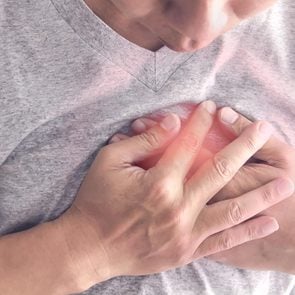6 Breathing Mistakes You’re Making—And How to Breathe Better
Updated: Mar. 07, 2022
There's a good chance you're making one of these breathing mistakes. Here's how to fix them, and what you need to know in order to breathe better.
Are you breathing correctly?
As far as bodily functions go, breathing is a bit mindless.
We innately know how to do it the moment we leave the womb, and many people buzz about their day without thinking about inhaling, exhaling, inhaling…
The lungs, diaphragm, and intercostal muscles work together to allow a person to breathe, explains Jonathan Parsons, MD, a pulmonologist and professor of internal medicine at The Ohio State University Wexner Medical Center.
“In order for people to breathe efficiently, all of these body parts must work in unison,” he says. “If one part is dysfunctional, breathing will not be efficient.”
It’s only when we encounter an issue—asthma, other breathing conditions, or panic attacks, for instance—that we pay attention to our breath.
Here’s what you need to know about breathing, from warning signs of dysfunctional breathing to ways to keep your lungs healthy and breathe better.
Signs you’re breathing wrong
Breathing may be an involuntary action, but there are some danger or warning signs to know, says Purvi Parikh, MD, an allergist and immunologist with the Allergy & Asthma Network.
If you have trouble taking a deep breath, gasp for air, or have trouble completing sentences, you probably have a breathing issue, she says.
Other warning signs of trouble include coughing or wheezing. But there are also less-obvious signs of less-serious breath-related issues.
You overthink your breathing
One mistake people make is overthinking their breath, according to otolaryngologist Abbas Anwar, MD, head and neck surgeon at Providence Saint John’s Health Center in Santa Monica, California.
It’s a natural process, and overthinking it can lead to anxiety and sometimes even shortness of breath.
Trust yourself. You’ve been breathing since the moment you were born. You got this.
You mostly breathe through your mouth
Another mistake you may make is constantly breathing through your mouth instead of your nose.
In fact, 30 to 50 percent of adults are breathe through the mouth, especially in the morning, according to the journal Nursing in General Practice.
Although this is OK at times, breathing through the nose is ideal because the nose can filter out toxins and allergens and humidify the air that you breathe, according to Dr. Anwar.
Mouth breathing increases the risk of dry mouth. And it is associated with a higher risk of potentially life-threatening asthma (most likely linked to allergies that cause a stuffy nose), according to research in the journal Allergy.
If your nose is so congested that you are breathing through your mouth, there’s an issue, Dr. Parikh says.
“However, breathing through the mouth is sometimes necessary for patients who have nasal obstruction, which can be due to things like allergies, sinus infections, or nasal polyps,” he says. “If you notice that you have difficulty breathing through your nose most of the time, you should visit your ENT [an ear, nose, and throat doctor] to help figure out the issue.”
You don’t exhale completely during exercise
Not exhaling completely while exercising is a common breathing error, Dr. Parsons says.
“Often, we work out with tense shoulder and neck musculature while running, walking, or cycling, which limits the efficiency of our respiratory system,” he says.
There’s an easy fix: focus on breathing in through your nose and out through your mouth while working out.
“Making an effort to consciously breathe in through your nose and out through your mouth for balanced respiration during exercise leads to the most efficient respiration,” says Dr. Parsons.
You have poor posture
Not having an upright posture causes compression of the chest cavity, limiting the range of motion available for the diaphragm and intercostal musculature, Dr. Parsons says.
If you make this mistake, you may end up taking rapid or shallow breaths instead of slow, deep breaths that fill your lungs.
“Making an effort to not be hunched over while breathing will increase efficiency,” he says.
You suck your belly in when you breathe
“Sucking your belly in while breathing limits the diaphragmatic range of motion,” Dr. Parsons says. “Relaxing the abdomen during breathing helps mitigate this issue.”
In other words, if you suck in your stomach, you don’t let your body expand as it needs while you inhale. And that means you won’t get enough air.
During inhalation, the rib cage and belly should expand. And during exhalation, the belly goes back in.
To test how you’re doing, put a palm on your belly. When you breathe in, you should feel your belly expanding outward beneath your hand. As you breathe out, your hand will follow your belly back in.
You breathe in pollution
Although there’s only so much you can do to breathe in less air pollution, Dr. Anwar points out that breathing in air pollution is a mistake that many people make even inside their own homes.
“Often people are unaware of this, but polluted air can lead to airway irritation and may decrease the efficiency of oxygen transport from your lungs to your blood,” Dr. Anwar says. “It is important to monitor the air quality inside and outside and work in environments that are clean and well-ventilated, if possible.”
You may want to consider investing in an air purifier.

How to breathe better
One of the best ways to breathe better is to fix the common breathing mistakes that you may be unknowingly making. So work on your posture, breathe through your nose, and focus on the other breathing mistakes listed above.
Once you’ve done that, focus on the following steps, which will help you breathe easier.
Exercise regularly
The most important factor in breathing properly is to maintain a healthy lifestyle, according to Dr. Anwar.
Working out regularly improves lung capacity and allows you to take in more oxygen with each breath, he says. Plus, exercise can help you lose weight.
Maintaining an ideal weight allows your lungs to expand fully and prevents other breathing issues. Obesity increases your risk of certain breathing conditions, such as obstructive sleep apnea, and can make symptoms worse.
Don’t smoke
It should come as no surprise that to improve your lungs, you’ll need to avoid smoking. After all, the habit is notoriously terrible for your lungs.
Smoking can damage the lungs and prevent appropriate oxygen uptake into the bloodstream, says Dr. Anwar.
Cigarettes aren’t the only lung destroyers (though they’re certainly high on the list). Dr. Parikh suggests avoiding other pollutants, like marijuana smoke, as well.
Smoking is a risk factor for chronic obstructive pulmonary disease, or COPD, a progressive, chronic lung disease that causes shortness of breathe, fatigue, and wheezing. (Emphysema is a type of COPD.)
About 16 million people in the United States have been diagnosed with COPD, although millions more might have it but don’t know it.
Get vaccinated
Viral and bacterial pneumonia can permanently scar and damage your lungs, according to Dr. Parikh.
“Many young, [otherwise] healthy Covid-19 patients needed lung transplants,” she says. “Vaccines will prevent this.”
Other vaccines protect against pneumonia (PCV13 and PPSV23 protect children and adults against pneumococcal bacteria), pertussis (whooping cough), and tuberculosis. And getting your yearly flu shot is also a good idea to avoid respiratory infections.
Safeguard your health and get your Covid-19 vaccine.
See your doctor for any issues
If you suffer from airborne allergies, get tested, diagnosed, and treated by a board-certified allergist, Dr. Parikh says.
“Most asthmatics and allergy sufferers are living with uncontrolled disease, which is dangerous, as it leaves your lungs inflamed, scarred, and in some cases can be deadly,” she says.
Persistent nasal congestion and shortness of breath are two more good reasons to visit your doctor.
Next, check out these breathing exercises for anxiety.















